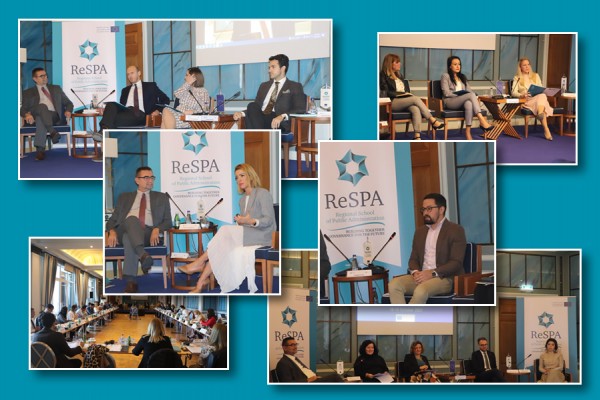
Regional Conference on Policy Coordination – a great forum of exchange of experiences and practices related to policy coordination
The Regional Conference held on 18-19 October 2021 in Tivat, Montenegro brought together more than 40 senior public servants from the Western Balkans responsible for implementing the government role in policy coordination in various aspects as well as renowned experts and practitioners from across the Region. Integral part of the Conference was a brief inaugural meeting of the informal Network of Policy Coordinators in Western Balkan (still to be settled how will be shaped) which discussed further plans of ReSPA support to efforts of the governments in improving policy coordination.
In his welcoming speech, Mr Dragan Đurić, ReSPA Programme Manager – Coordinator, highlighted the need to develop high-quality, evidence-based policies and policy cycles and enhancing the role of public administration in that. “During this year, ReSPA has been devoted to contributing to a more efficient implementation of public administration reform in the region by strengthening policy coordination, especially the coordination among PAR and PFM strategies. The first step in achieving this goal was the development of Analytical paper on Policy coordination in Western Balkans based on which ReSPA experts developed six national analytical documents which provided in-depth analyses of policy coordination systems and processes in each of the Western Balkan administrations. Through national workshops organized from June till October, more than 120 senior officials from Western Balkans administrations discussed the most important segments of these analyses and defined policy recommendations. These two days were devoted to presentation of various aspects of policy coordination, and to exchange of experiences and practices in Western Balkans and broader, thanks to the online participation of OECD/SIGMA experts.
The idea for launching a Regional Network of Policy Coordinators shall be a crucial step in enhancing policy coordination in the Western Balkans in the upcoming period,” emphasized Mr Đurić.
The Conference focused on comparing the legislative and institutional framework for policy coordination in Western Balkans administration, providing examples of the coordination of PAR and PFM strategies, strategic planning and mid-term planning, coordination of EU integration process, EU acquis alignment, IPA III assistance, and capacity development for policy coordination. Through comparison of experiences, presentation of successful practices and finally through the answering the question how civil society see the quality of policy coordination in Western Balkans the Conference provided new initiatives on further strengthening policy coordination in the Region.
In the conclusions of the Conference, ReSPA Programme Manager, Mr Gentian Xhaxhiu, emphasized among others, that one of the options to enhance capacity development related to policy coordination, is to use internal capacities that already exist in line ministries for transferring knowledge and skills from senior public servants to newcomers. In addition, it is important to change the mindset of the public administrations across the WBs in order to conduct early consultation with the public, civil society and other stakeholders when developing policies and strategies. Lastly, it was noted that good work is done as regards the reduction of number of strategies in each of the administrations but there is still room for reduction; this would better streamline the support from the donor community and would create a more friendly environment for policy implementers.
In the end of the Conference, attendees brainstormed on the possibility to organize by the beginning of next year, the annual school on policy coordination, which will be organized throughout the year and will target a considerable number of civil servants of different levels.



